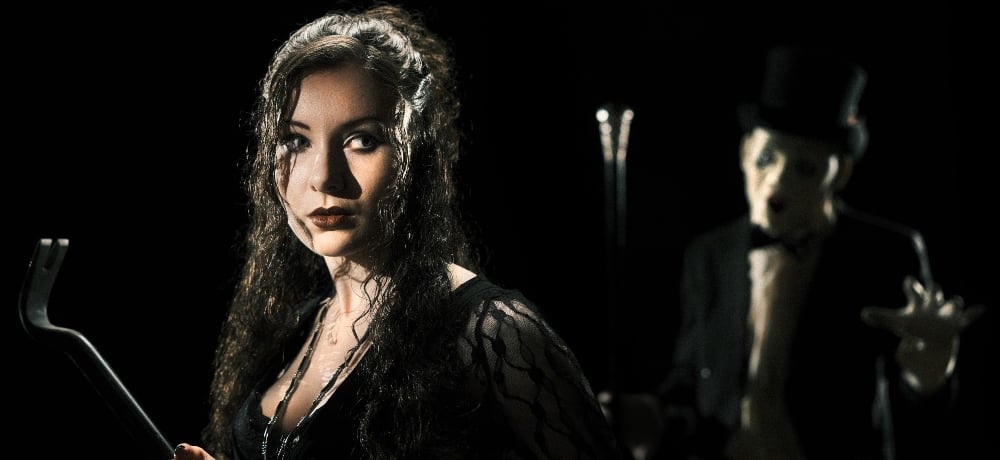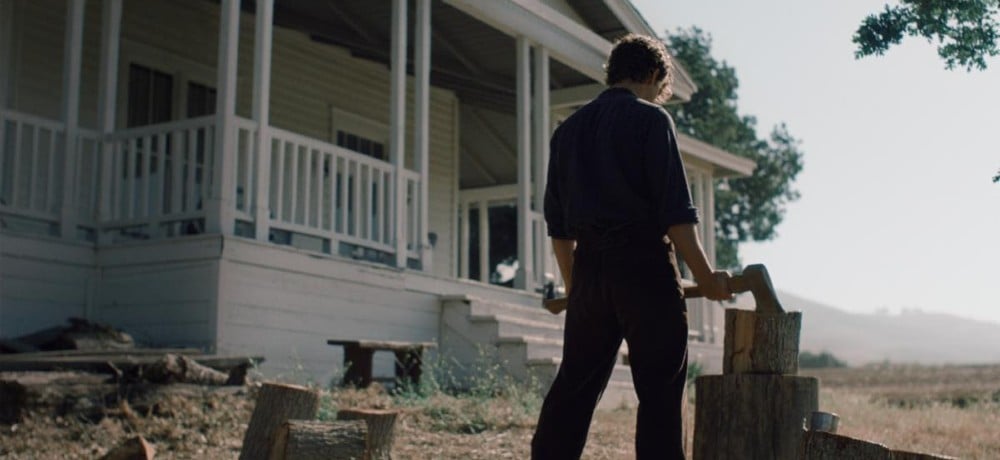






There are two sides to every story. Take Abraham Van Helsing’s legacy. Bram Stoker’s Dracula positions Van Helsing as a vampire-hunting savior who vanquishes the bloodsucking count—but what if that’s propaganda? Natasha Kermani’s adaptation of Joe Hill’s short story “Abraham’s Boys” portrays a different side of Van Helsing. The line between hero and monster is wafer-thin, which Kermani explores in a 1900s period piece that takes an iconic horror figure to task.
Titus Welliver stars as Dr. Abraham Van Helsing, who has relocated his family to a secluded plot of land in California’s Central Valley. We evaluate Abraham from his eldest son Max’s (Brady Hepner) perspective: an overprotective husband to his ill wife Mina (Jocelin Donahue) and a stern parent to his littlest Rudy (Judah Mackey). Mina’s affliction is related to vampirism, and Abraham lives in constant fear that creatures will storm their household, attracted to Mina’s scent. It’s time for Max and Rudy to learn Abraham’s craft, but after entering his vampire-killing world, they begin to fear their dear father may be far more sinister than his teachings let on.
Kermani’s Little Fangs on the Prairie tale is beholden to a clunkier brand of 1910s period terrors, where Abraham hides from California’s expanding railroad lines. Julia Swain’s Americana cinematography spans windblown grassy fields and sprawling Western mountain ranges, highlighting the Van Helsings’ isolation. Abraham removes his family from society, which makes for a quieter narrative about domestic issues and minimal interference. A quote about vampirism opens the film, but those familiar with Hill’s bite-sized literature will know that’s a bit misleading. Abraham’s Boys is assuredly a Van Helsing movie, but hardly a vampire flick.
The film’s pacing poses a problem, given the emphasis on understated horrors. Welliver’s performance dictates discomfort as he’s revealed to be an abusive, hot-headed lunatic devoted to an in-question cause, but there’s a deadness in the air. Abraham frequently warns his children of possible threats banging on their door, but the waiting game becomes tedious. Conversations tell us what to fear versus being shown, which is the nature of Hill’s story—not as successful in cinematic delivery. Scenes linger as Max chops wood, Abraham scolds his kin, and Mina lies sick in bed, but dread never swells to fill the silence. Kermani gets lost in the film’s narrative foreplay, laying teases on hot and heavy without sufficient follow-through.
Welliver’s imposition as this stoic representation of evil masquerading as good is successfully creepy at points. He never smiles, hiding pearly whites that beam in contrast to his sunbaked skin, and speaks with an assertive dominance that puts everyone in their place. The way he chides Max and Rudy is worse than driving a stake through undead fiends, but it’s also all the film has in terms of suspense. We fear for Max as Abraham’s outbursts worsen, leaving bruises and threatening “purification.” When you remove vampirism from Abraham’s profession, he’s just a serial killer, and that’s a fascinating examination. Unfortunately, a lack of intensity feels more one-note due to Abraham’s more surgical and sterile attributes.
I kept thinking of comparison points like I Am The Pretty Thing That Lives In The House or 1922, where horrors struggle to surface. Kermani utilizes vampiric imagery in a dream sequence or flies a bat indoors as an ominous omen, but Abraham’s Boys is too dialogue-reliant. The weight of Abraham’s words should sting like the dickens, yet they echo around an empty atmosphere. There’s an overdramatization to Max and Rudy’s conversations, while Donahue’s maddened state—where she freaks out about feeling unsafe—isn’t enough to jostle us from a lullaby-like stasis. It’s a sobering and sorrowful experience to a fault, becoming listless instead of disturbing.
Abraham’s Boys is a sullen period flick that subverts vampire expectations but shambles through its themes of hereditary prisons and inherited sins. Kermani’s talents as a filmmaker are evident in pictorial aspects and the performance she draws from Welliver, but her film never rises above a murmur. It’s a meandering experience headed towards an inevitable payoff that comes and goes with the wind. Dangerous and vile in unexpected ways, yet underwhelming when it’s all said and done.
Movie Score: 2.5/5